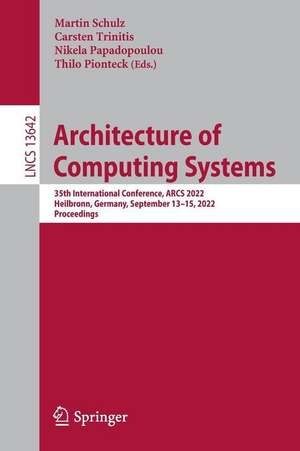Architecture of Computing Systems: 35th International Conference, ARCS 2022, Heilbronn, Germany, September 13–15, 2022, Proceedings: Lecture Notes in Computer Science, cartea 13642
Editat de Martin Schulz, Carsten Trinitis, Nikela Papadopoulou, Thilo Piontecken Limba Engleză Paperback – 14 dec 2022
The 18 full papers in this volume were carefully reviewed and selected from 35 submissions.
ARCS provides a platform covering newly emerging and cross-cutting topics, such as autonomous and ubiquitous systems, reconfigurable computing and acceleration, neural networks and artificial intelligence. The selected papers cover a variety of topics from the ARCS core domains, including energy efficiency, applied machine learning, hardware and software system security, reliable and fault-tolerant systems and organic computing.
Din seria Lecture Notes in Computer Science
- 20%
 Preț: 1061.55 lei
Preț: 1061.55 lei - 20%
 Preț: 307.71 lei
Preț: 307.71 lei - 20%
 Preț: 438.69 lei
Preț: 438.69 lei - 20%
 Preț: 579.30 lei
Preț: 579.30 lei -
 Preț: 410.88 lei
Preț: 410.88 lei - 17%
 Preț: 427.22 lei
Preț: 427.22 lei - 20%
 Preț: 596.46 lei
Preț: 596.46 lei - 15%
 Preț: 448.04 lei
Preț: 448.04 lei - 20%
 Preț: 353.50 lei
Preț: 353.50 lei -
 Preț: 389.49 lei
Preț: 389.49 lei - 20%
 Preț: 309.90 lei
Preț: 309.90 lei - 20%
 Preț: 645.28 lei
Preț: 645.28 lei - 20%
 Preț: 763.23 lei
Preț: 763.23 lei - 15%
 Preț: 580.46 lei
Preț: 580.46 lei - 20%
 Preț: 310.28 lei
Preț: 310.28 lei - 20%
 Preț: 655.02 lei
Preț: 655.02 lei - 20%
 Preț: 1183.14 lei
Preț: 1183.14 lei - 20%
 Preț: 340.32 lei
Preț: 340.32 lei -
 Preț: 449.57 lei
Preț: 449.57 lei - 20%
 Preț: 591.51 lei
Preț: 591.51 lei - 18%
 Preț: 938.83 lei
Preț: 938.83 lei - 20%
 Preț: 337.00 lei
Preț: 337.00 lei - 20%
 Preț: 649.50 lei
Preț: 649.50 lei - 20%
 Preț: 607.40 lei
Preț: 607.40 lei - 20%
 Preț: 1414.79 lei
Preț: 1414.79 lei - 20%
 Preț: 1024.44 lei
Preț: 1024.44 lei - 20%
 Preț: 583.40 lei
Preț: 583.40 lei - 20%
 Preț: 453.32 lei
Preț: 453.32 lei - 20%
 Preț: 575.49 lei
Preț: 575.49 lei - 20%
 Preț: 1075.26 lei
Preț: 1075.26 lei - 20%
 Preț: 585.88 lei
Preț: 585.88 lei - 20%
 Preț: 825.93 lei
Preț: 825.93 lei - 17%
 Preț: 360.20 lei
Preț: 360.20 lei - 20%
 Preț: 763.23 lei
Preț: 763.23 lei - 20%
 Preț: 340.32 lei
Preț: 340.32 lei - 20%
 Preț: 504.58 lei
Preț: 504.58 lei - 20%
 Preț: 369.13 lei
Preț: 369.13 lei - 20%
 Preț: 580.93 lei
Preț: 580.93 lei - 20%
 Preț: 343.62 lei
Preț: 343.62 lei - 20%
 Preț: 350.21 lei
Preț: 350.21 lei - 20%
 Preț: 583.40 lei
Preț: 583.40 lei - 20%
 Preț: 583.40 lei
Preț: 583.40 lei - 15%
 Preț: 438.59 lei
Preț: 438.59 lei - 20%
 Preț: 341.95 lei
Preț: 341.95 lei - 20%
 Preț: 238.01 lei
Preț: 238.01 lei - 20%
 Preț: 538.30 lei
Preț: 538.30 lei
Preț: 418.43 lei
Preț vechi: 523.03 lei
-20% Nou
Puncte Express: 628
Preț estimativ în valută:
80.08€ • 86.95$ • 67.26£
80.08€ • 86.95$ • 67.26£
Carte tipărită la comandă
Livrare economică 22 aprilie-06 mai
Preluare comenzi: 021 569.72.76
Specificații
ISBN-13: 9783031218668
ISBN-10: 3031218663
Pagini: 287
Ilustrații: XVII, 287 p. 137 illus., 98 illus. in color.
Dimensiuni: 155 x 235 mm
Greutate: 0.44 kg
Ediția:1st ed. 2022
Editura: Springer International Publishing
Colecția Springer
Seria Lecture Notes in Computer Science
Locul publicării:Cham, Switzerland
ISBN-10: 3031218663
Pagini: 287
Ilustrații: XVII, 287 p. 137 illus., 98 illus. in color.
Dimensiuni: 155 x 235 mm
Greutate: 0.44 kg
Ediția:1st ed. 2022
Editura: Springer International Publishing
Colecția Springer
Seria Lecture Notes in Computer Science
Locul publicării:Cham, Switzerland
Cuprins
Energy Efficiency.- Energy Efficient Frequency Scaling on GPUs in Heterogeneous HPC Systems.- Dual-IS: Instruction Set Modality for Efficient Instruction Level Parallelism.- Pasithea-1: An Energy-Efficient Self-Contained CGRA With RISC-Like ISA.- Applied Machine Learning.- Orchestrated Co-Scheduling, Resource Partitioning, and Power Capping on CPU-GPU Heterogeneous Systems via Machine Learning.- FPGA-based Dynamic Deep Learning Acceleration for Real-time Video Analytics.- Advanced Computing Techniques.- Effects of Approximate Computing on Workload Characteristics.- QPU-System Co-Design for Quantum HPC Accelerators.- Hardware and Software System Security.- Protected Functions: User Space Privileged Function Calls.- Using Look Up Table Content as Signatures to Identify IP Cores in Modern FPGAs.- Hardware Isolation Support for Low-Cost SoC-FPGAs.- Reliable and Fault-tolerant systems.- Memristor based FPGAs: Understanding the Effect of Configuration Memory Faults.- On the Reliability of Real-time Operating System on Embedded Soft Processor for Space Applications.- Special Track: Organic Computing.- NDNET: a Unified Framework for Anomaly and Novelty Detection.- Organic Computing to Improve the Dependability of an Automotive Environment.- A context aware and self-improving monitoring system for field vegetables.- Semi-Model-Based Reinforcement Learning in Organic Computing Systems.- Deep Reinforcement Learning with a Classifier System – First Steps.- GAE-LCT: A run-time GA-based Classifier Evolution Method for Hardware LCT controlled SoC Performance-Power Optimization.
